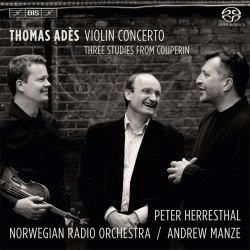| 
Support
us financially by purchasing this from |
 |
|
Thomas ADÈS (b. 1971)
Violin Concerto ‘Concentric Paths’, Op. 23 (2005) [19:10]
I. Rings [4:13]
II. Paths [9:38]
III. Rounds [5:11]
Three Studies from Couperin (2006) [14:09]
1. Les Amusemens [4:49]
2. Les Tours de Passe-passe [3:45]
3. L’Âme-en-Peine [5:31]
Peter Herresthal (violin)
Norwegian Radio Orchestra (Kringkastingsorkestret)/Andrew Manze
rec. April 2013, Store Studio, NRK Oslo, Norway
Only available as a download (24-bit/96kHz, mp3). High-res version reviewed
BIS BIS8003 [34:13]
I’ve said it many times, but this is the kind of contemporary repertoire that BIS do best. That said, they aren’t the first to record these two Adès works; that privilege belongs to EMI - now Warner - whose pioneering release was much praised by Leslie Wright in 2010 (review). Thank goodness BIS didn’t wait for suitable fillers - Wigglesworth’s long-delayed Shostakovich Fifteenth Symphony comes to mind - before they issued this coupling as a download only. That was a wise move, as they would have been pilloried for releasing a disc with just half an hour of music on it. At least their per-second charging method means these files are priced at just over $5, which is a terrific bargain in anyone’s book.
It’s fitting that violinist Peter Herresthal is the soloist
in the concerto, as he premiered it in Austria, Spain, Norway and
Australia. Conductor Andrew Manze needs no introduction; a violinist
himself he tends to focus on music of the Baroque and early Classical
periods, although he has ventured as far afield as Brahms (review).
Given his long-established HIP credentials - beginning with his associate
directorship of the Academy of Ancient Music in 1996 - he may seem
an odd choice for such up-to-the-minute rep. Then again unexpected
collaborations is something else BIS do rather well,
In his Seen & Heard review
of a 2012 concert that included this concerto Colin Clarke confessed
that until then he’d found Adès’s music ‘fussy’
and ‘too clever for its own good’; those were my sentiments
on hearing the EMI/Rattle recording of Asyla and These Premises
Are Alarmed when it first appeared in 1999. Since then Adès
has grown in stature, and his opera The Tempest was critically
acclaimed at its London premiere in 2004.
The small-scale Violin Concerto, with its seemingly paradoxical subtitle
‘Concentric Paths’, followed a year later. In his typically
enthusiastic liner-notes broadcaster and journalist Tom Service uses
celestial and cartographic references to elaborate on the composer’s
method; some listeners may crave such a context, but Adès’s
blend of gentle rigour and underlying lyricism speaks for itself.
Indeed, this concerto couldn’t be further from the gratuitous
virtuosity and blackboard-clawing dissonances that the timid or untutored
might expect of such a work.
Yes, there is a pervasive element of dark declamation - it seems the timps are kept on a rolling boil for much of the time - but otherwise the music is fresh, mobile and always engaging. Even the gnarled central movement has fragments of repose, and the finale - fiddle, brass and percussion locked in a strange circling dance - has a certain sprightliness and charm. Any longueurs? None, although churls might say it’s much too short for that; what is clear, though, is that despite his relative ‘accessibility’ Adès has no truck with the anodyne or autopilot. Factor in Herresthal’s full toned and beautifully spun lines, incisive orchestral playing and a top-notch recording - hurrah, no knob twiddling required - and you have a winning combination.
How does this newcomer compare with the Adès/Marwood version
on EMI/Warner? It’s very different; for a start it’s nowhere
near as volatile or as trenchant, and that makes for a more grateful
listening experience. Marwood’s violin tone is also edgier -
pretty much in line with the performance as a whole - and the composer’s
sometimes dogged reading is less appealing than Manze’s more
supple and varied one. Make no mistake the earlier recording is compelling,
albeit in a more forceful way; the close, bright acoustic intensifies
that uncompromising mood. The more sophisticated BIS sound is matched
by a performance of great subtlety and refinement, and that’s
enough to swing it for me.
Adès is nothing if not versatile, and the concerto is followed by his lightly sprung and pleasingly forensic orchestrations of works by Couperin. The music’s inner voices are crystal clear and Manze ensures rhythms are as pliable as one could wish; dynamic contrasts are startling, too. The real joy resides in the mingled sense of astonishment and delight that only an intimate knowledge of the scores and the skills of a sensitive orchestrator can bring. It’s all so beautifully judged, and the very natural, nicely nuanced sound is first rate.
Once again comparisons with that EMI/Warner disc are instructive. Adès and the Chamber Orchestra of Europe give a somewhat drier reading of these pieces, and that makes them seem more like pedagogic ‘studies’ than they do under Manze. Crucially, the latter - perhaps inspired by HIP and a deep affinity for Baroque music in general - emphasises the intricacy and colour of these scores to heart-warming effect. As with the concerto Manze is livelier and more spontaneous than his predecessor; the BIS recording is to be preferred as well.
Thirty minutes of music may seem like short measure, but when it’s this persuasively played and presented - it’s keenly priced, too - there’s no reason to grumble. Indeed, these pieces - especially in these embraceable performances - are a perfect entrée for those who wish to explore Adès’s increasingly accomplished and interesting œuvre.
Two contemporary works of singular style and substance; fine engineering, too.
Dan Morgan
http://twitter.com/mahlerei
 |
 |
|











